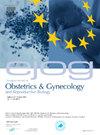使用机械心脏瓣膜的孕妇的母胎结局:三级中心经验
IF 2.1
4区 医学
Q2 OBSTETRICS & GYNECOLOGY
European journal of obstetrics, gynecology, and reproductive biology
Pub Date : 2025-05-04
DOI:10.1016/j.ejogrb.2025.114028
引用次数: 0
摘要
目的机械心脏瓣膜患者需要终身抗凝以预防血栓栓塞并发症。怀孕导致高凝状态,增加了这些事件的风险。虽然指南推荐使用维生素K拮抗剂(VKA)抗凝,但最近的做法是用低分子肝素(LMWH)代替VKA,以减少胎儿并发症和母体并发症的增加。本研究旨在分析机械心脏瓣膜抗凝合并VKA或低分子肝素的妊娠患者的结局。方法回顾性分析2008年至2024年在我院三级保健中心就诊的机械心脏瓣膜置换术孕妇的病例系列。产妇的主要结局是死亡率和血栓栓塞并发症。次要结局是产前出血、心脏事件(心律失常、心力衰竭、非血栓性瓣膜功能障碍)、产后出血。胎儿结局包括活产和抗凝相关胎儿异常,胎儿颅内出血,小于胎龄。结果纳入的11例患者中,4例(36%)在妊娠期间接受了围孕期VKA和低分子肝素治疗,3例(27%)在妊娠期间接受了VKA治疗,3例(27%)在妊娠前期开始接受低分子肝素治疗,1例(9%)在妊娠早期接受低分子肝素治疗,并在妊娠14周时转为VKA治疗(顺序方案)。2例接受低分子肝素治疗的患者发生血栓栓塞并发症:1例发生瓣膜血栓形成,1例发生非瓣膜血栓形成。7例妊娠导致活产,3例终止妊娠,1例流产。1例患者在妊娠26周接受序贯治疗时发生胎儿硬膜下血肿。没有其他与抗凝剂相关的主要胎儿异常的报道。结论我们的研究结果与现有文献一致,表明接受低分子肝素的机械心脏瓣膜患者的产妇并发症发生率更高。关于妊娠期使用VKA治疗的患者的有限数据妨碍了关于其安全性的明确结论。本文章由计算机程序翻译,如有差异,请以英文原文为准。
Maternal and fetal outcomes in pregnant women with mechanical heart valves: A tertiary center experience
Objective
Patients with mechanical heart valves require lifelong anticoagulation to prevent thromboembolic complications. Pregnancy induces a hypercoagulable state, increasing the risk of those events. Although guidelines recommend anticoagulation with vitamin K antagonists (VKA), recent practice involves replacing VKA with low-molecular weight heparin (LMWH) to reduce fetal complications with an increase in maternal complications. This study aims to analyze outcomes in pregnant patients with mechanical heart valves anticoagulated with VKA or LMWH.
Methods
This was a retrospective case series of pregnant patients with mechanical heart valves referred to our tertiary care center from 2008 to 2024. Primary maternal outcomes were mortality and thromboembolic complications. Secondary outcomes were antepartum bleeding, cardiac events (arrhythmias, heart failure, non-thrombotic valvular dysfunction), postpartum hemorrhage. Fetal outcomes included live births and anticoagulant-related fetal anomalies, fetal intracranial bleeding, small for gestational age.
Results
Among the eleven patients included based on chart review, four (36 %) received VKA peri-conceptionally and LMWH during pregnancy, three (27 %) received VKA throughout pregnancy, three (27 %) started LMWH preconceptionally and one (9 %) received LMWH in the first trimester and switched to VKA at 14 weeks (sequential regimen). Thromboembolic complications occurred in two patients receiving LMWH: one experienced valvular thrombosis and one non-valvular thrombosis. Seven pregnancies resulted in live births, three in termination of pregnancy and one ended in missed abortion. One fetal subdural hematoma occurred in a patient on sequential therapy at 26 weeks of pregnancy. No other major fetal anomalies related to anticoagulants were reported.
Conclusions
Our findings align with existing literature, indicating a higher incidence of maternal complications in women with mechanical heart valves receiving LMWH. Limited data on patients treated with VKA during pregnancy preclude definitive conclusions regarding its safety.
求助全文
通过发布文献求助,成功后即可免费获取论文全文。
去求助
来源期刊
CiteScore
4.60
自引率
3.80%
发文量
898
审稿时长
8.3 weeks
期刊介绍:
The European Journal of Obstetrics & Gynecology and Reproductive Biology is the leading general clinical journal covering the continent. It publishes peer reviewed original research articles, as well as a wide range of news, book reviews, biographical, historical and educational articles and a lively correspondence section. Fields covered include obstetrics, prenatal diagnosis, maternal-fetal medicine, perinatology, general gynecology, gynecologic oncology, uro-gynecology, reproductive medicine, infertility, reproductive endocrinology, sexual medicine and reproductive ethics. The European Journal of Obstetrics & Gynecology and Reproductive Biology provides a forum for scientific and clinical professional communication in obstetrics and gynecology throughout Europe and the world.

 求助内容:
求助内容: 应助结果提醒方式:
应助结果提醒方式:


